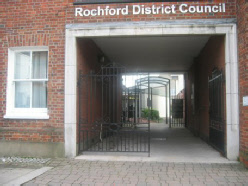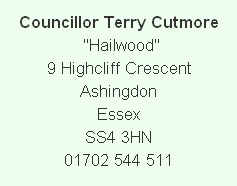

Make a point of visiting us weekly!
Local Government
Rochford District Council
Rochford District Council


To return to the Rochford District Council front page, please CLICK HERE

First Part of Interview with Councillor Terry Cutmore (15th December 2010)
Terry Cutmore is the key leader of Rochford District Council. Possibly of any interview we have conducted this had been the most difficult to write up. The reason for this has been Terry’s breadth of knowledge and experience and the fact that this ‘interview’ was more of a casual conversation which ranged over a wide variety of subjects, some of which for space sake we’ve omitted. To make understanding easier in respect of what we have left in, we’ve included ‘sub-headings’ which we hope you will find helpful.
Again, because of the length of the article, you will find this is the first of two pages and there is a third page that covers Terry’s summary of Council activities that is found in the minutes of the 2010 October Council meeting.
In this first half of the interview we cover general matters of the operating of the District Council. In the second part we will go on to see Terry’s personal and political background, some further workings of the Council, and issues he believes will be significant in the coming days.
Rochford Life: You are the leader of the Conservative Group in the Council and Leader of the Council, and Chair of the Executive.
Accountability of the Executive
Terry: Yes, that’s right the Executive is the little Cabinet, if you like, with seven portfolio holders and the Executive is the mainstay of the decision making body. We still have the full council and anything that goes through the Executive can be ‘called in’ by two members and they can refer up for a full decision of the Council anyway.
We also have a Scrutiny Committee which is our backstop if you like, and again for any decision that is being made, if they feel they want to talk about that or it is a wrong decision, they can call that in to examine it and look at it and refer back. The Scrutiny Committee doesn’t have any power of decision but they can recommend things in respect of to the decisions made by the individual portfolio holders or sometimes the collective executive decisions made.
Planning Ahead
Now we produce a Key Lines of Enquiry which goes four months ahead, and that tells you the key decisions that are coming forward in the next four months and it will show whose responsibility that will be, the Executive or the individual portfolio holder. It’s a public document showing the major decisions coming forward, and of course every member can see this and if they have an interest in particular things they can either speak to the portfolio holder or me and put their view in. The Scrutiny Committee normally look at that regularly and see if there any things coming up of interest to see if they want to look at it further.
RL: You are the portfolio holder for Overall Strategy and Policy Direction. What does that actually mean and what do you cover?
Policy & Objectives
Terry: Pretty much everything; it really is. Overall policy: the policy of the Council will include major changes in things like the Constitution, whether we do things in a certain way, the upper management tiers of the staff etc. It’s about what our corporate objectives are and how our policies coming forward meet those corporate objectives. It’s controlling all the others in the Executive, to make sure they don’t make decisions without referring to me, making sure that things are running as they should be running. The buck stops with me if you like.
RL: Do you meet regularly with the senior officers of the Council?
Portfolio Members & Officers
Terry: Not so much all the officers. I certainly meet with my own Chief Executive on a regular basis. We meet at least every month, we probably see each other every other day, and when we don’t see each other we probably speak to each other on the phone anyway, so we are very close. If you look at the individual portfolio holders and their subsequent opposite member of staff, they are pretty much the same as well. They will have regular meetings with them as well which are internally minuted. Sometimes I go with them to get a catch up as to how that particular portfolio holder is doing in respect of what they are supposed to be delivering.
RL: So each portfolio holder has this direction of what we are doing in the next four months, almost an agenda really?
Terry: What we want to take forward is usually decided about January or February time, what our objectives are for the following year, what we particularly want to do, any aims we want to meet.
RL: Are objectives governed by finances?
Financial Planning
Terry: Everything is governed by finances. We have a five-year medium-term finance strategy so that for anything that is coming forward within our plans, we have to show that we have a budget to actually cover our ability to attain that particular objective. As I said, we look forward five years and that’s been very useful for us in the past because when you have something like the Waste contract coming up, we put a little bit aside because we knew it would be more than previously, whatever we did. If we hadn’t done that and identified this thing coming up in the future we might have had a problem finding some of the funds or have to cut back what we did as far as the contract was concerned. We have an IT contract coming forward with the current supplier. We changed the profile of what they delivered because they were actually doing purchases for us. We found we could do it a lot cheaper if we did it ourselves and managed to shave, I think it was £300,000 a year off the contract; they are very expensive these contracts. Clearly there is a cost to us because we take over what they did but we actually saved money on the equipment as well. We’ve extended that contract two years but are actually looking to work with other councils with our contracts in the future. If we work collectively we work much more cheaply and that’s the way forward I think for a lot of things, particularly back office stuff that councils are delivering at the moment.
RL: You mentioned Refuse just now. Rochford is quite good for that isn’t it?
Refuse & Recycling
Terry: Not too bad. I think on the original figures we were top dog in the country but when they adjusted various things I think we still come about third and certainly top in the East of England and our recycling is about 61%. It’s the public who do it not us; they are the ones who have taken this up and look at when things have got to go out and which bin it’s got to go in and they are very diligent about it, and that’s brilliant; we’ve had fantastic co-operation from the public. The only thing we thought might be a problem was having three bins. It’s interesting, when you go somewhere like Southend people go, we don’t want a wheelie-bin, but the point is that they are clean, they’re efficient, there’s no smell and the only problem might be having room for them. We actually wrote to every resident saying if you have a problem with siting these things, let us know and we’ll come along and help you with it. I think over 90% of our residents use them. Some are obviously in flats and they have individual methods. It was Michael Stark who now retired as a Councillor who carried that through. He was very good at what he did. We take away all the garden stuff as well now, and that all goes up to St.Ives and I’ve visited and seen what they’ve done with it. Believe it or not it doesn’t smell up there and all they do it put it through a system to produce an end fertiliser material that they sell to farmers and it’s very efficient . (See article on letsrecyle.com about Rochford & recycling)
RL: You produce Rochford Matters regularly. It must cost money? Is it good value?
The Value of Communicating with the Public
Terry: It does but it’s actually mostly paid for by Virgin Active, they cover most of the cost of that. It’s interesting when you talk to people about Rochford Matters because you know it’s gone to certain properties and yet when you ask you get varied responses. It’s the same old thing that sometimes a leaflet gets delivered and one member of the family see it and then bin it and others don’t know it’s come. There is important stuff in there because we do surveys and provide information, say about gritting, reporting things and hopefully some helpful stuff as well, so people like the PCT put articles in there as well, and other agencies, just to make sure the public is aware of certain things as well.
RL: Increasingly the number of people who have Internet access goes up. Have you thought about sending out things by Internet and e-mail.
Electronic Possibilities?
Terry: Yes, the last figure I saw was about 72% but if you look at the number of hits we have on our website, that goes up exponentially ever year. People go there, for instance, for what bin is it this week, and there is travel stuff on there, links to other sites, and of course a lot of the planning stuff is on there as well, and many other things. Rochford District Matters, is on the website, a fuller edition than you get through your door. I think electronic delivery may be something that may happen in the future; it’s all about percentages and costs. The cost of producing it and delivering it is probably not as much as you think. There will always be some who couldn’t receive it by e-mail and then you look at the costs of a small-print run and it will be the result of looking at it on a cost-benefit basis, so it is something that could happen in the future.
To go to Part TWO of this interview, please CLICK HERE
Terry Cutmore is the key leader of Rochford District Council. Possibly of any interview we have conducted this had been the most difficult to write up. The reason for this has been Terry’s breadth of knowledge and experience and the fact that this ‘interview’ was more of a casual conversation which ranged over a wide variety of subjects, some of which for space sake we’ve omitted. To make understanding easier in respect of what we have left in, we’ve included ‘sub-
In this first half of the interview we cover general matters of the operating of the District Council. In the second part we will go on to see Terry’s personal and political background, some further workings of the Council, and issues he believes will be significant in the coming days.
Rochford Life: You are the leader of the Conservative Group in the Council and Leader of the Council, and Chair of the Executive.
Accountability of the Executive
Terry: Yes, that’s right the Executive is the little Cabinet, if you like, with seven portfolio holders and the Executive is the mainstay of the decision making body. We still have the full council and anything that goes through the Executive can be ‘called in’ by two members and they can refer up for a full decision of the Council anyway.
We also have a Scrutiny Committee which is our backstop if you like, and again for any decision that is being made, if they feel they want to talk about that or it is a wrong decision, they can call that in to examine it and look at it and refer back. The Scrutiny Committee doesn’t have any power of decision but they can recommend things in respect of to the decisions made by the individual portfolio holders or sometimes the collective executive decisions made.
Planning Ahead
Now we produce a Key Lines of Enquiry which goes four months ahead, and that tells you the key decisions that are coming forward in the next four months and it will show whose responsibility that will be, the Executive or the individual portfolio holder. It’s a public document showing the major decisions coming forward, and of course every member can see this and if they have an interest in particular things they can either speak to the portfolio holder or me and put their view in. The Scrutiny Committee normally look at that regularly and see if there any things coming up of interest to see if they want to look at it further.
RL: You are the portfolio holder for Overall Strategy and Policy Direction. What does that actually mean and what do you cover?
Policy & Objectives
Terry: Pretty much everything; it really is. Overall policy: the policy of the Council will include major changes in things like the Constitution, whether we do things in a certain way, the upper management tiers of the staff etc. It’s about what our corporate objectives are and how our policies coming forward meet those corporate objectives. It’s controlling all the others in the Executive, to make sure they don’t make decisions without referring to me, making sure that things are running as they should be running. The buck stops with me if you like.
RL: Do you meet regularly with the senior officers of the Council?
Portfolio Members & Officers
Terry: Not so much all the officers. I certainly meet with my own Chief Executive on a regular basis. We meet at least every month, we probably see each other every other day, and when we don’t see each other we probably speak to each other on the phone anyway, so we are very close. If you look at the individual portfolio holders and their subsequent opposite member of staff, they are pretty much the same as well. They will have regular meetings with them as well which are internally minuted. Sometimes I go with them to get a catch up as to how that particular portfolio holder is doing in respect of what they are supposed to be delivering.
RL: So each portfolio holder has this direction of what we are doing in the next four months, almost an agenda really?
Terry: What we want to take forward is usually decided about January or February time, what our objectives are for the following year, what we particularly want to do, any aims we want to meet.
RL: Are objectives governed by finances?
Financial Planning
Terry: Everything is governed by finances. We have a five-
RL: You mentioned Refuse just now. Rochford is quite good for that isn’t it?
Refuse & Recycling
Terry: Not too bad. I think on the original figures we were top dog in the country but when they adjusted various things I think we still come about third and certainly top in the East of England and our recycling is about 61%. It’s the public who do it not us; they are the ones who have taken this up and look at when things have got to go out and which bin it’s got to go in and they are very diligent about it, and that’s brilliant; we’ve had fantastic co-
RL: You produce Rochford Matters regularly. It must cost money? Is it good value?
The Value of Communicating with the Public
Terry: It does but it’s actually mostly paid for by Virgin Active, they cover most of the cost of that. It’s interesting when you talk to people about Rochford Matters because you know it’s gone to certain properties and yet when you ask you get varied responses. It’s the same old thing that sometimes a leaflet gets delivered and one member of the family see it and then bin it and others don’t know it’s come. There is important stuff in there because we do surveys and provide information, say about gritting, reporting things and hopefully some helpful stuff as well, so people like the PCT put articles in there as well, and other agencies, just to make sure the public is aware of certain things as well.
RL: Increasingly the number of people who have Internet access goes up. Have you thought about sending out things by Internet and e-
Terry: Yes, the last figure I saw was about 72% but if you look at the number of hits we have on our website, that goes up exponentially ever year. People go there, for instance, for what bin is it this week, and there is travel stuff on there, links to other sites, and of course a lot of the planning stuff is on there as well, and many other things. Rochford District Matters, is on the website, a fuller edition than you get through your door. I think electronic delivery may be something that may happen in the future; it’s all about percentages and costs. The cost of producing it and delivering it is probably not as much as you think. There will always be some who couldn’t receive it by e-
To go to Part TWO of this interview, please CLICK HERE